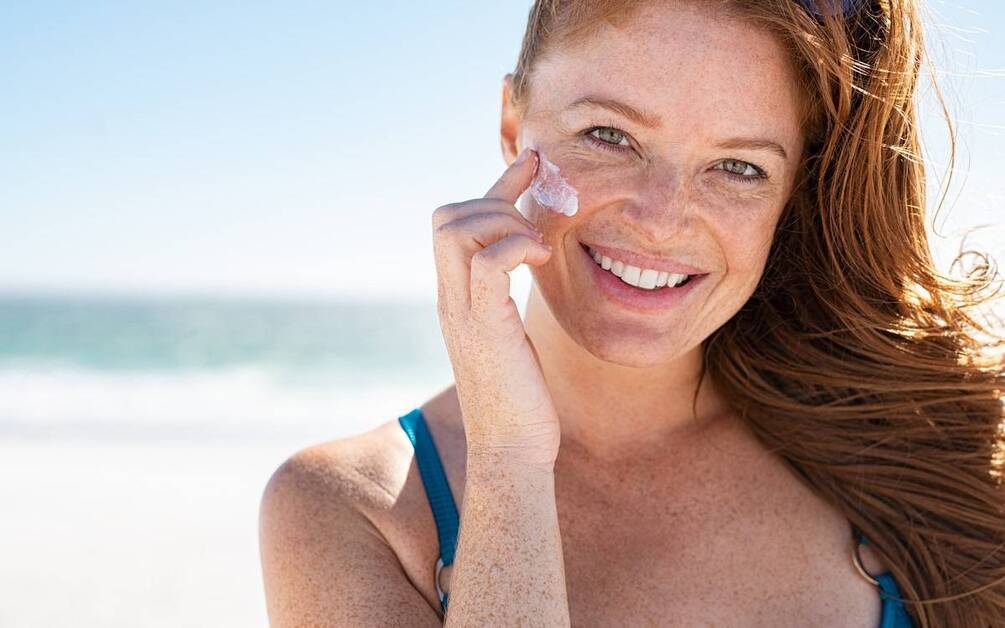
08 May Is sunscreen anti-aging?
[ux_gallery ids=”8944″ columns=”1″]Did you really know how anti-aging really does its job? Anti-aging is described as delaying the aging process so that the skin would look younger than the age. The ingredients that are categorized as anti-aging are peptides, stem cells, retinoids, vitamins, azelaic acid, hyaluronic acid and glycolic acid. There are ways and rules to properly apply these ingredients on skin, if you are a beginner, read more before wearing it.
Here are the signs of aging that you need to know
Saggy skin is a result of aging, elastin and collagen loss, as well as environmental factors such UV exposure, pollution, and lack of nutrition. It can be seen anywhere on the body when elastin and collagen production decline as people age.
Fine lines and wrinkles are two common signs of aging that develop as the skin loses its elasticity and collagen production decreases. Your skin becomes drier and more wrinkled as a result of the decreased production of natural oils. Fat in the deeper layers of your skin diminishes. Hence, your skin becomes less elastic and more wrinkles appear.
[/accordion-item] [accordion-item title=”Age Spots”] [ux_image id=”8971″]Age spots are caused by an overproduction of melanin, the pigment that gives skin its color. As the skin is exposed to sunlight over time, the accumulation of ultraviolet radiation causes the melanin producing cells to become more active, resulting in the formation of age spots.
[/accordion-item] [accordion-item title=”Open Pores”] [ux_image id=”8970″]As you age, your skin becomes less elastic, stretching and sagging, giving the appearance of bigger pores. As you become older, your skin also becomes thicker, which causes tiny skin cells to accumulate around your pores, enlarging them.
[/accordion-item] [accordion-item title=”Dull Skin”] [ux_image id=”8973″]Dull skin is mainly caused by lack of exfoliation and dehydration. The appearance of your skin will become dull as dead skin cells build up on the surface. These dead skin cells will make it more difficult for the next products you apply to your skin to absorb. They can also clog inside your pores that leads to breakout.
Technically, sunscreen is not classified as anti-aging. However, sunscreen could prevent the said signs of aging skin caused by sunlight so that the skin would be firm and elastic for longer. The anti-aging ingredients are not working if you are not protecting your skin from the hazards of damaged skin, i.e., UV radiation. It is vital to protect your skin from UV radiation via SPF and PA++++, that are contained in sunscreen.
[title text=”How does sunscreen tackle aging?” tag_name=”h4″ icon=”icon-search” width=”673px” margin_top=”3px” margin_bottom=”2px”]Sunscreen helps prevent premature aging by protecting the skin from the harmful effects of UV radiation. UV radiation can cause damage to the skin cells, leading to wrinkles, fine lines, sagging, open pores, dull skin, patchy and age spots. When the skin is exposed to the sun, the UV radiation triggers the production of free radicals, which are harmful molecules that contribute to skin aging.
[ux_image id=”8974″] [ux_text text_color=”rgb(0,0,0)”]Sunscreen works by blocking UV radiation from reaching the skin, preventing free radicals, and reducing the damage to the skin cells. This helps to preserve the skin’s collagen and elastin, two essential proteins that keep the skin looking firm and elastic. By using sunscreen regularly, you can reduce the signs of aging and keep your skin youthful and healthy-looking for longer.
[/ux_text]Prevention is better than cure! Start using sunscreen daily especially whenever going out that exposes your skin to the sunlight. Remember to frequently reapply sunscreen for every two to four hours. When extra care is taken towards skin, it could prolong the elasticity of your skin and delay the process of aging. Love your skin more.


Sorry, the comment form is closed at this time.